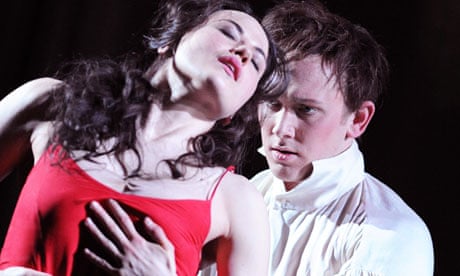If Eugene Onegin is a study of how an intelligent man can ruin his life by rejecting the woman who could have been his soul mate and killing his best friend in a duel, then Kasper Holten's production of it is an equally convincing demonstration of how an intelligent director can destroy one of the greatest operas in the repertoire. It's Holten's first staging as director of opera at Covent Garden, which suggests it's a work in which he feels he has something special to offer. But much of what he puts on stage undermines the carefully plotted dramaturgy; it also runs counter to what is left unsaid in Tchaikovsky's libretto, but is clear from Pushkin's poem, to which the opera is so faithful.
Here the action unfolds through the memories of the older Tatyana and Lensky, who watch their younger selves play out the tragedy. It's the double who writes Tatyana's letter, watched by Krassimira Stoyanova's Tatyana, and it's a more youthful incarnation of Onegin who kills Lensky in the duel, while Simon Keenlyside's twitchy, conflicted character watches on, wringing his hands in anguish. The result is muddled and distracting; having effectively destroyed the letter scene, which Stoyanova sings well, Holten undermines the heartbreaking climax of the final scene, too, by bringing both doubles back on stage at precisely the moment when Tatyana remembers how happy the couple could have been.
By now, there is little chance of recapturing any of Onegin's unique emotional power. Though the visual trappings – sets by Mia Stensgaard, costumes by Katrina Lindsay – are in period and fairly conventional, Holten's production flirts with Regietheater (director-led opera). Tatyana (or, more accurately, her double) is manhandled by the peasants in the opening chorus, Pavol Breslik's Lensky appears for the duel dragging a huge tree branch behind him (his corpse remains on stage throughout the final scenes), while Peter Rose's touching Gremin returns to witness the final parting between his wife and Onegin.
For every perceptive idea, there are at least two bad ones. Despite some decent central performances (though Keenlyside's voice was a little threadbare by the end), and excellent support from Diana Montague's Madame Larina, Kathleen Wilkinson's Filipyevna and Elena Maximova's Olga, it's deeply flawed musically, too. Robin Ticciati's conducting veers between hectic and ponderous – the letter scene almost grinds to a halt – and his conducting of the dance music is erratic, but as Holten reduces that element to insignificance anyway, that hardly matters as much as it should.

Comments (…)
Sign in or create your Guardian account to join the discussion